 Petzlover
Petzlover Kangal Dog is originated from Turkey but Sindh Mastiff is originated from India. Both Kangal Dog and Sindh Mastiff are having almost same height. Both Kangal Dog and Sindh Mastiff are having almost same weight. Kangal Dog may live 3 years more than Sindh Mastiff. Both Kangal Dog and Sindh Mastiff has same litter size. Kangal Dog requires Moderate Maintenance. But Sindh Mastiff requires Low Maintenance
Kangal Dog is originated from Turkey but Sindh Mastiff is originated from India. Both Kangal Dog and Sindh Mastiff are having almost same height. Both Kangal Dog and Sindh Mastiff are having almost same weight. Kangal Dog may live 3 years more than Sindh Mastiff. Both Kangal Dog and Sindh Mastiff has same litter size. Kangal Dog requires Moderate Maintenance. But Sindh Mastiff requires Low Maintenance
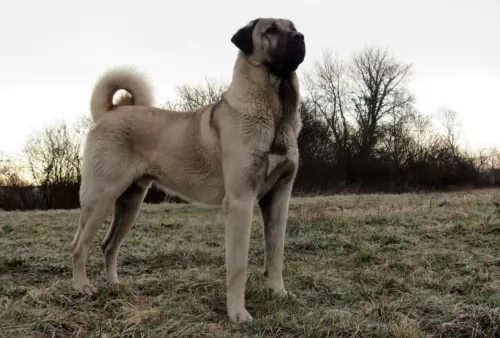 The magnificent looking Kangal Shepherd Dog, a purebred Mastiff type dog, is often referred to as a sheep dog and hails from the Sivas province of Turkey.
The magnificent looking Kangal Shepherd Dog, a purebred Mastiff type dog, is often referred to as a sheep dog and hails from the Sivas province of Turkey.
The Kangal Dog is a distinct breed and the National Dog of Turkey. These are working dogs who made their appearance in the UK in 1965.
It is interesting to note that in June 2018 the Turkish Kennel Club, Köpek Irklari ve Kinoloji Federasyonu, classifies Kangal Shepherd Dogs to be the same population as the Anatolian Shepherd dog.
 The Sindh Mastiff or Alangu Mastiff is an ancient breed believed to have been useful for guarding war camps, but today he is both a guard dog and pet.
The Sindh Mastiff or Alangu Mastiff is an ancient breed believed to have been useful for guarding war camps, but today he is both a guard dog and pet.
There isn’t too much information available to us about the origins of this dog but it is thought that they came about from breeding the Indian Mastiff and the Alaunt.
He is likened to the Bully Kutta dog, a huge Mastiff breed from Pakistan. This dog is one of three mastiff type dog breeds to be found around Persia and India. Unfortunately because of its aggressive nature, it has been used for dog fighting.
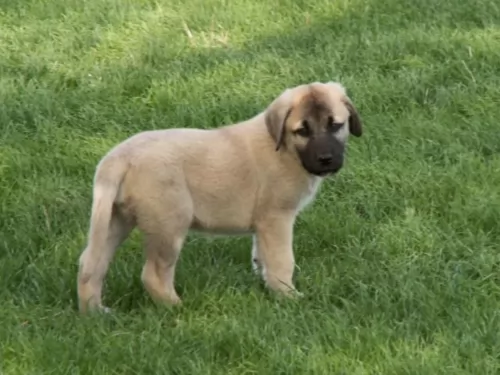 This is a large, heavily boned dog with a big head with a black mask and medium sized floppy ears. Looking at him, he has a Mastiff-like appearance but isn't as heavy as some Mastiff breeds, allowing it more speed and agility.
This is a large, heavily boned dog with a big head with a black mask and medium sized floppy ears. Looking at him, he has a Mastiff-like appearance but isn't as heavy as some Mastiff breeds, allowing it more speed and agility.
He stands at roughly 72cm to 85cm male and female, and weighs about 50 to 63kg. He has a solid double coat of dense hair which is a pale tan color.The coat is short and dense. The Kangal Dog is powerful and when he is alert, the long tail is held over the back, otherwise he holds it down with a slight curl.
The Kangal is known for his good looks, but he is also alert, sharp, territorial and confident, while also being calm. These dogs have an instinctive wariness of strange dogs and they are also reserved with strangers but are loving, loyal and protective with their human family.
In fact, the Kangal Shepherd Dog is protective while being gentle with small children and animals. He is an intelligent breed too, and having him trained and socialized won’t be a problem.
It is always a wise move to have a big dog like this trained and socialized, making him obedient and even more amicable than he already is.
 The Alangu Mastiff is a huge dog, standing anything from 80 – 84cm in height and weighing 62 – 68kg. He is muscular and strong. He has a broad skull with small pricked ears, wide apart eyes and a thick neck.
The Alangu Mastiff is a huge dog, standing anything from 80 – 84cm in height and weighing 62 – 68kg. He is muscular and strong. He has a broad skull with small pricked ears, wide apart eyes and a thick neck.
The legs are powerful and muscled, the skin fairly loose over the body with hair that is short ad dense. The coat can be white, tan, fawn or brindle.
Sometimes the dog has a black mask. The tail is thick and long these days, although it used to be docked.
This dog has a domineering, ferocious nature and that is why it has been sought after as a guard dog. He is territorial and thought to be aggressive. He is therefore not a good choice of dog for first time dog owners. He is also not a good choice for when there are children in the home or even small pets.
He is strong willed and fairly difficult to train. Of course it is a known fact that a puppy turns out a lot like its owners. Good owners produce a good tempered dog, but you have to be careful with this dog as it has aggressive tendencies.
Certainly it will require a strong, firm consistent owner, and then the dog is capable of becoming loyal and devoted. Training and socialization are possible as he is intelligent, and it does help to make him more submissive to his human owners.
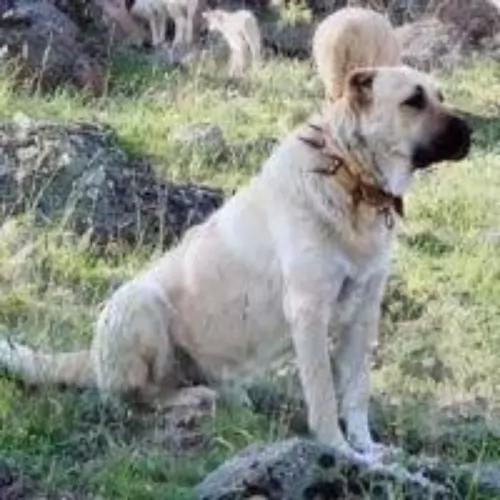 Your Kangal Dog is a big, powerful dog. His very size size won't suit him living in the city in small spaces and tiny gardens. He is far better suited to life in the suburbs or to country life where he can move around easily.
Your Kangal Dog is a big, powerful dog. His very size size won't suit him living in the city in small spaces and tiny gardens. He is far better suited to life in the suburbs or to country life where he can move around easily.
In spite of his size, he is a calm, balanced, independent, protective dog. He may well be aloof towards strangers, but a trained and well-socialized Kangal Dog is friendly, loving and loyal pet with his human family and with visitors to the house.
This is a beautiful dog and it will be an honor to have such a wonderful pet in your home. Treat him well and you're bound to have the most fantastic protector, guardian and friend.
 Domineering and quite aggressive, particularly if brought up that way, the Sindh Mastiff has a fairly long history of dog fighting. He is an intelligent dog and should be trained and socialized. He is also very territorial. He isn’t suitable for first time dog owners as he does have a bit of a reputation as being a fairly ferocious dog.
Domineering and quite aggressive, particularly if brought up that way, the Sindh Mastiff has a fairly long history of dog fighting. He is an intelligent dog and should be trained and socialized. He is also very territorial. He isn’t suitable for first time dog owners as he does have a bit of a reputation as being a fairly ferocious dog.
However, you have to give this dog some credit, and with the right upbringing, proper training and socialization, he can make a loyal pet and companion for a strong, firm, patient, kind and consistent type of owner.
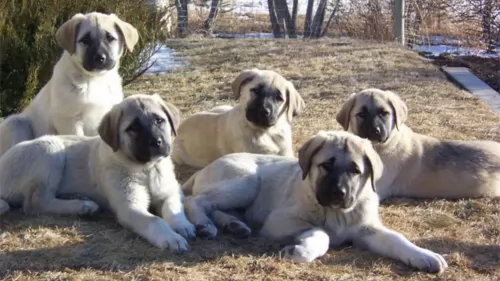 This is most important if you don't intend your Kangal Dog becoming a parent, and is good for the health of your dog.
This is most important if you don't intend your Kangal Dog becoming a parent, and is good for the health of your dog.
Your Kangal Dog puppy needs certain vaccinations at certain stages of his life to prevent him from getting some life threatening dog diseases. Keep a check on your dog's health and realize, that although the Kangal Dog is a healthy dog breed, he can develop canine illnesses such as eye diseases, ear infections, bloat, skin allergies and hip dysplasia among others.
Your dog may then require veterinary intervention to heal him of any of these.
To keep your pet happy and healthy, make sure to pick up your dog's faeces every day. This is for your own health's sake too.
 The Sindh Mastiff is a healthy breed of dog who could develop any one of the main dog illnesses there are, although it is highly unlikely to get the diseases.
The Sindh Mastiff is a healthy breed of dog who could develop any one of the main dog illnesses there are, although it is highly unlikely to get the diseases.
A common problem with dogs is canine cancer, of which lymphosarcoma and bone cancer are common. Then you have to be aware of bloat or gastric dilatation volvulus, which is particular common in deep-chested dogs. The stomach dilates and twists, and blood supply is cut off.
This is a life threatening illness. Urinary tract infections and skin conditions are just some of the diseases your pet will need to contend with.
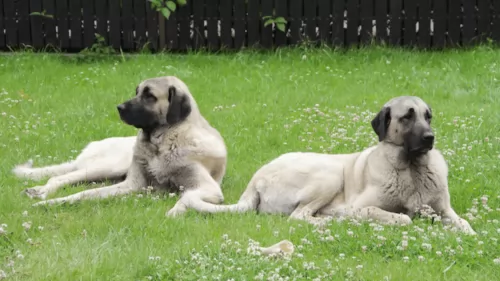 The Kangal Dog can be a wonderful pet in your home, but because you’ve made the decision to bring him into your home, it becomes your responsibility to ensure his happiness and wellbeing.
The Kangal Dog can be a wonderful pet in your home, but because you’ve made the decision to bring him into your home, it becomes your responsibility to ensure his happiness and wellbeing.
These ‘care’ tips can help you, particularly if you’re a first time dog owner -
Remember that a puppy will need 4 meals a day of soft, recommended puppy food. By the time your dog reaches his first birthday, one or two meals a day will be good.
There are some top quality commercial manufactured foods to choose from, and the packaging labeling will guide you to which one.
Adding in some home-made food such as nutritious cooked chicken, rice and vegetables will be a treat for your pet and don’t forget some raw meat occasionally too.
Fresh, cool water should be within reach of your pet around the clock.
Dogs need exercise to maintain their lean bodies but it will also stimulate their minds and keep them healthy. The exercise needs of your dog will depend on his size, age, health and breed type. Fun and games as well as daily walks will satisfy your Kangal Dog and keep him content.
Help keep your Kangal Dog looking groomed and cared for. He is a fairly heavy, seasonal shedder. Remove loose hairs with brushing the coat twice a week. Check for fleas and ticks at the same time and for any unusual lumps.
Every dog needs a warm, dry, quiet place to rest and sleep, inside and outside. Make sure that when your dog is outside that he has a place to rest in the shade and sun, as he chooses.
 This is a low maintenance dog as the short coat will only require a brush twice a week. As you brush him take note of any unusual lumps you come across.
This is a low maintenance dog as the short coat will only require a brush twice a week. As you brush him take note of any unusual lumps you come across.
Also, while grooming him, check the inside of his ears and look for signs of redness and the possibility of an ear infection. Look into his eyes and make sure they are clear and bright.
Check inside his mouth, if he will allow you to, and make sure he doesn’t have any bad teeth. These could cause a lot of pain and also cause problems with body organs such as the heart and the kidneys.
This is a big dog that is going to need plenty of exercise. He is not suited to small spaces in the city but will require a fairly large property in the suburbs or the countryside. He will become frustrated and more dangerous to others if left day after day without exercise.
The Sindh Mastiff is an energetic dog, so it is important do ensure he has good food to eat to ensure he remains fit and energetic. For convenience, commercially manufactured dog foods can be a good choice, but only when you choose the better quality ones with vitamins and minerals in them.
Some of the inferior food brands load the food with bad fillers, colorants and preservatives and these can all make your pet sick. Try and give him some home made food too – nothing exotic – just plain boiled chicken, brown rice or pasta and spinach, sweet potatoes and carrots.
Your dog will thank you for such a plain diet as then he isn’t plagued by digestive problems. Chop it all up and add it into the dry kibble a couple of times a week. Try and include some raw meat into the diet occasionally to avoid skin problems. Always ensure a constant supply of fresh, cool water.